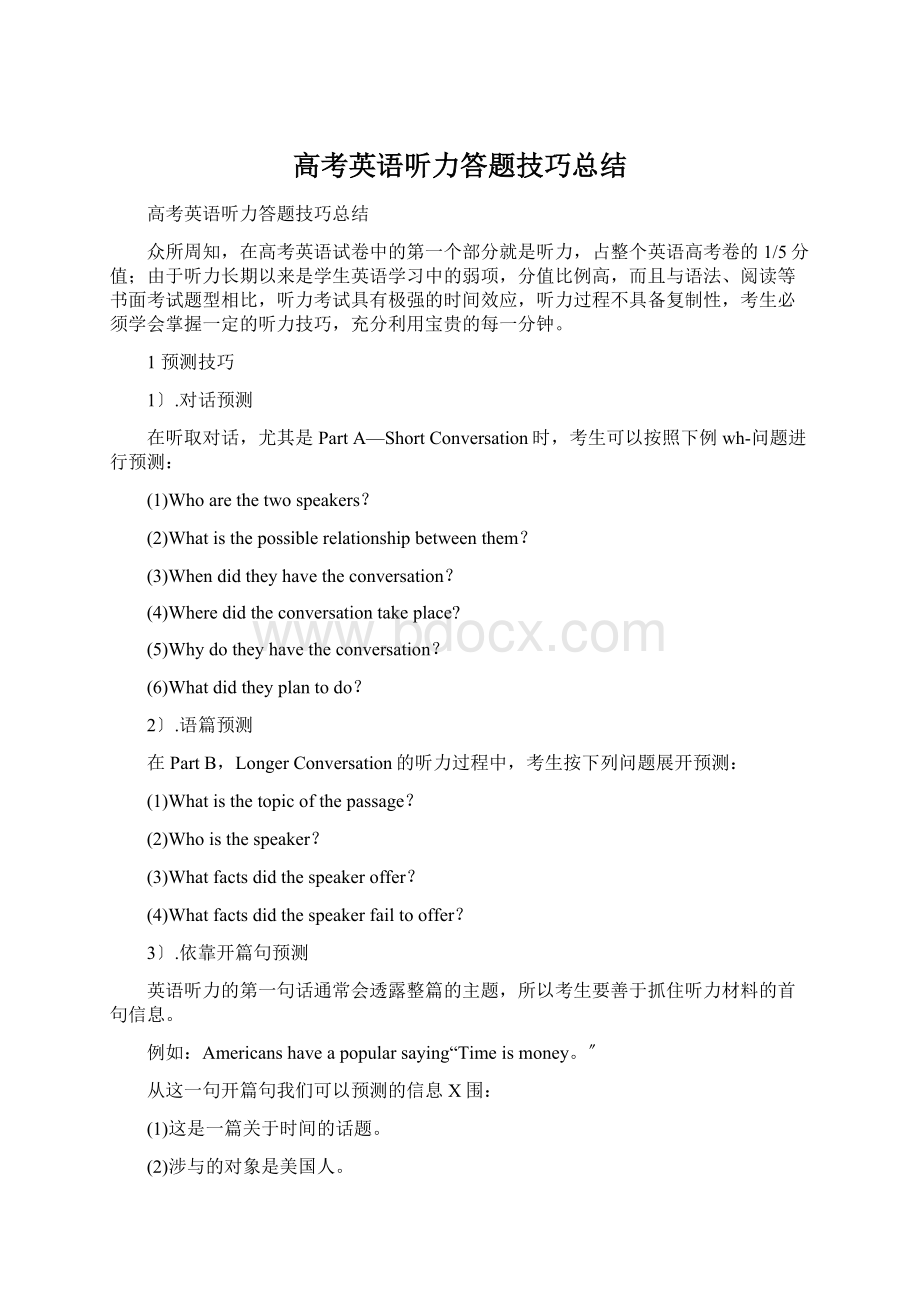高考英语听力答题技巧总结.docx
《高考英语听力答题技巧总结.docx》由会员分享,可在线阅读,更多相关《高考英语听力答题技巧总结.docx(19页珍藏版)》请在冰豆网上搜索。

高考英语听力答题技巧总结
高考英语听力答题技巧总结
众所周知,在高考英语试卷中的第一个部分就是听力,占整个英语高考卷的1/5分值;由于听力长期以来是学生英语学习中的弱项,分值比例高,而且与语法、阅读等书面考试题型相比,听力考试具有极强的时间效应,听力过程不具备复制性,考生必须学会掌握一定的听力技巧,充分利用宝贵的每一分钟。
1预测技巧
1〕.对话预测
在听取对话,尤其是PartA—ShortConversation时,考生可以按照下例wh-问题进行预测:
(1)Whoarethetwospeakers?
(2)Whatisthepossiblerelationshipbetweenthem?
(3)Whendidtheyhavetheconversation?
(4)Wheredidtheconversationtakeplace?
(5)Whydotheyhavetheconversation?
(6)Whatdidtheyplantodo?
2〕.语篇预测
在PartB,LongerConversation的听力过程中,考生按下列问题展开预测:
(1)Whatisthetopicofthepassage?
(2)Whoisthespeaker?
(3)Whatfactsdidthespeakeroffer?
(4)Whatfactsdidthespeakerfailtooffer?
3〕.依靠开篇句预测
英语听力的第一句话通常会透露整篇的主题,所以考生要善于抓住听力材料的首句信息。
例如:
Americanshaveapopularsaying“Timeismoney。
〞
从这一句开篇句我们可以预测的信息X围:
(1)这是一篇关于时间的话题。
(2)涉与的对象是美国人。
4〕.根据打印在试卷上的听力试题内容预测。
例如:
(A)Husbandandwife.
(B)Waiterandcustomer.
(C)Studentandteacher
(D)Receptionistandguest
根据听力试题,考生可以预测到该对话肯定是侧重于对话人的身份,所以在听力过程中抓住透露双方关系的关键词即可。
2识别关键词的技巧
1〕.透露说话人身份的关键词
如果考生可以通过关键词很快判断对话者的关系和身份,将有助于考生有目的地集中注意力,并在脑海中搜索相关背景知识,进一步加深对听力材料的理解。
例如:
Ijustcan’tbelieveyouareapoliceofficer,Kay.Irememberinhighschool,youalwayswantedtobealawyer.
如果考生意识到该对话中的关键词为inhighschool,那么他马上可以意识到这是两个老同学之间的对话。
又例如:
Goodmorning,ladiesandgentlemen.WelcometoUniversalStudio.I’dliketoguideyouallthewayintheamazingparkandsharethewonderfulmomentswithyou.
这段话的关键词是guide,park,从中考生可以推断说话人是导游。
以下是常见的对话者关系:
Husband——wife
Teacher——student
Boss——employee
Waiter——customer
Doctor——patient
Parents——kid
classmates——roommates
shopassistant——customer
2〕.透露地点/场合的关键词
考生如果善于捕捉听力材料中的关于地点或场合〔即语言环境〕的关键词,也有助于他们判断听力材料的主题、说话人之间关系等等。
如果对话中出现specialprice,那么对话很可能发生在商店;treatment,therapy等词可以透露出医患关系,以下是有关机场或者旅馆的关键词:
Checkin入住登记checkout结账
porter搬luggage行李
bookaroom预定房间doubleroom双人房
passenger乘客economyclass经济舱businessclass公务舱runway跑道
passport护照flight航班stewardess乘务员
3〕.捕捉数字
许多听力材料中涉与数字,例如年代、日期、价格、数量等等,并且会以基数词、序数词、分数、小数、百分比等形式出现,这就要求考生辨别各种形式的数字,还要熟悉数字之间的关系。
例如:
减价:
20%off,specialoffer,specialprice,25%discount,sale
原价:
regularprice,normalprice
增长:
10%increasein…1/3climbin……
下降:
23%fallin…5.5%decreasein…
3听力速记技巧
高考听力的第二部分LongerConversation所占时间较长,如果考生能够培养一定的速记技巧,有助于保持部分听力内容,帮助记忆。
毕竟高考的长篇对话时间并不算太长,高三考生只要进行初级的入门速记锻炼,不必把听到的所有内容写下来,只要捕捉一些关键性问题即可,比如时间、地点、数字以与相关信息等等。
考生可以尝试以下技巧:
1〕.运用速记符号
例如:
↑up↓down←left→right=equal
2〕.发明并运用字母的缩写形式
考生可以在平时训练时,本着便于记忆、快速、容易联想的原则,发明一些只需自己明白的字母搭配来表示相应的信息。
例如:
ex——expensivelg——largeeq——earthquakeys——yesterday通过运用这些字母和符号,帮助考生储存信息,帮助回忆。
4时间运用技巧
1〕充分利用试卷刚发下来,听力还未播放的宝贵时间,阅读听力试题,并用铅笔在听力试题上画出重点(听力的试题部分考生可以在上面涂写,但是答卷部分禁止)。
此刻考生可以运用预测技巧,对听力内容进行有的放矢的预测。
2〕建议考生在听力播放过程中在试题卷上答题,而不是直接写在电脑答卷上,以节约时间。
3〕切记对于没有听清的试题〔尤其是PartA——shortconversation〕采取与时放弃的原则,即随便选择一个选项,把注意力集中到下一题,一定要抢在下一题播放之前,看完下一题的全部4个选项,千万不可纠缠于已播放好的前一题。
5.词汇
许多考生可能有这样的经历:
听力过程中整个句子中仅仅因为一个单词未理解,使得考生对整个句子甚至语篇的理解产生误解,所以高三考生需要掌握尽可能大的词汇量,以备不时之需。
听力是一个不断实践的学习过程,对语言综合运用能力提出很高的要求,高三考生须本着循序渐进、持之以恒的训练方针,在语法、词汇、听力技巧、心理素质等各个方面进行操练。
20XX高等学校招生全国统一考试〔XX卷〕英语听力
1.Whatwillthemanprobablydo?
A.Takearest.B.Gotoaparty.C.Meethisboss.
2.Whatdoweknowabouttheman?
A.Hehasbeencaughtcopyingareport.
B.Heisnotfreeatthemoment.
C.Hewon’tleavetillthelastminute.
3.Whatisthewomanconcernedabout?
A.Herhealth.B.Hercharacter.C.Herappearance.
4.Whatdoesthemanmean?
A.Thefridgewillbefixed.
B.Theroomwillbewarmer.
C.Thelightswillbeswitchedon.
5.Whatdoesthemanimply?
A.Thewomanalreadyhastoomanyshoes.
B.Thenewshoesdonotlookgoodenough.
C.Hedoesn’tcarewheretoputthenewshoes.
听第6段材料,回答第6、7题。
6.Whydoesn’tthemanwanttofly?
A.Hewantstoenjoythescenery.
B.Hethinksit’sdangerous.
C.Helikestakingthebus.
7.Whichmeansoftransportdoesthewomanprefer?
A.Thebus.B.Thetrain.C.Thecar.
听第7段材料,回答第8、9题。
8.Whyisthewomanworried?
A.Shedoesn’tknowwhattoread.
B.Shehasn’tfinishedhertask.
C.Shehasnotimetowriteherbook.
9.Whatdoweknowabouttheman?
A.HehasbeentoEuropewiththewoman.
B.Hehasforgottentowritehisreports.
C.Hehasfinishedreadingallthebooks.
听第8段材料,回答第10至12题。
10.Whathelpstoimpresstheinterviewerinthefirstplace?
A.Appropriatebodylanguage.
B.Excellentmemory.
C.Naturalvoice.
11.Whatshouldthemandobeforetheinterview?
A.Practicehandshaking.
B.Recitetheanswerstopossiblequestions.
C.Getsomeinformationaboutthecompany.
12.Whatadvicedoesthewomanofferaboutthetopicofsalary?
A.Nottomentionitatthefirstinterview.
B.Nottobringitupinaroundaboutway.
C.Tolettheinterviewermentionitnexttime.
听第9段材料,回答第13至16题。
13.Howdoesthemankilltime?
A.Byeatingpotatochips.B.BywatchingTV.C.Bytakingawalk.
14.Whatdoesthewomandislike?
A.Thesquare.B.Theparks.C.Thecity.
15.Whatdoesthemanthinkisthemostimportant?
A.Entertainment.B.Income.C.Quietness.
16.Whatdothemanandwomandisagreeon?
A.Whetherthecityneedsasymbol.
B.Whethertheamusementparkshouldbebuilt.
C.Whetherthesquareisagoodplaceforawalk.
听第10段材料,回答第17至20题。
17.WhatkindofEnglishlessonsdoesthespeakerrecommend?
A.Examinationskills.
B.Readingandwriting.
C.Listeningandspeaking.
18.Howcanalearnertakethelessonswhenheisnotonline?
A.Byusingthedownloadedsoundfiles.
B.Bymakingconversationswithothers.
C.Byreviewingwords,phrasesandidioms.
19.Whatismentionedasanadvantageofthespeaker’sonlinecourse?
A.Itimproveslearners’Englishskillsquickly.
B.Itofferslearnersbetterstudymethods.
C.Ithelpslearnerstomakefriends.
20.What’sthespeaker’sideaaboutlearningEnglish?
A.Beingconfidentinlearning.
B.LearningEnglishlittlebylittle.
C.Havingclearlearninggoals.
答案:
1—5CBCBA6—10ABBCA11—15CABAC16—20BCAAB
20XX高考英语〔XX卷〕听力原文
Text1—1.
W:
Youlooktired.Didyousleepwell?
M:
No,myfriendandIhadapartythewholenight.
W:
Youshouldgohomeandtakearest.
M:
Iknow,butmybosswantstoseemerightnow.
Text2—2.
W:
MayIhaveawordwithyou?
M:
You’vecutmeatabadtime.Iamwritingareportandhavetofinishitwithinanhour.
W:
Youreallylikeleavingthingstothelastminute.
M:
Iknowthisisaterriblehabit.
Text3—3.
W:
Steven,Ifinallydecidedtogoonadiet.
M:
Goodforyou,butdon'tpushyourselftoohard,Lucy.
W:
Youareright,butsummeriscomingandIdowishtolooksmartersooner.
M:
Youaresmartalready.Youseeyouarecleverandquickinmind.
Text4—4.
W:
Mygoodness,it’sfreezinghereintheroom.
M:
Iamsorry,man.ItwillbeokassoonasIturntheheatingon.
Text5—5.
W:
Darling,whatdoyouthinkofthesenewshoes?
M:
Umm,Iamwonderingwhereyouaregoingtoputthem,whenyouarenotwearingthem.
Text6—6-7
M:
Howarewegoingthere?
Haveyoudecidedyet?
W:
Shouldwefly?
It'sfast.
M:
Butifwefly,we'llmissthebeautifulscenery.
W:
Youareright,thenforgetaboutairplanes.
M:
Let'sdrivethen,wecanrentacar.
W:
Drive?
Thatsoundsdangerous.
M:
Thentheonlyotherchoicesarethetrainorthebus.I'dliketoseewhatAmericanbusesarelike.
W:
Theyarenotasniceastrains.
Text7—8-9
W:
Howareyou,John?
M:
Iamok,andyou?
Carol?
W:
Oh,busy,I'vebeenworkingonthosebookreportsforages.
M:
Me,too.Haveyoufinishedreadingthebooks?
W:
Ihaven't,andIamsoworried.Whataboutyou?
M:
Ialreadyhave,butthewritingisgoingsoslowly.IfeellikeIhavetoreadallthebooksagain.Iamsoforgetful.
W:
Ohreally?
Well,whatareyougoingtodoafteryou'vefinished?
M:
Idon'tknow;IhopeIcangotoEuropeandrelax.
W:
SodoI.
Text8—10-12
M:
Canyougivemesometipsofmycominginterview?
W:
Thefirstthingistotrytomakeagoodimpression.
M:
HowdoIdothat?
W:
First,firmlyshaketheinterviewer'shand,whilegreetinghimorherwithasmile.Besuretokeepeyecontact.
M:
Ah,Bodylanguageisreallyimportant,isn'tit?
W:
Yes,thesecondthingistohaveconfidence.Yougetconfidencefrombeingprepared.
M:
WhatshouldIdoforthat?
W:
Learnalittlebitaboutthecompanybeforetheinterview.Alsothinkofpossiblequestionsandanswers.
M:
ShouldIrecitemyanswers?
W:
No,youshouldsoundnaturalwhenyouspeak.
M:
ShouldIaskaboutthesalary?
W:
No,eitherletthembringoutthetopicofmoneyorelsewaitforasecondinterview.
Text9—13-16
M:
Hi,Wendy.
W:
Oh,Jonnie.Howareyoudoing?
Busy?
M:
No,notatall.I'vebeenacouchpotatolately,killingtimebywatchingTV.Oh,bytheway,didyouhearthenews?
W:
No,whatisit?
M:
Theyaregoingtoturnthecitysquareintoanamusementpark.
W:
Wonderful.Iamglad,thatbiganduglythingwillbegone.
M:
Youreallyare?
Inmyopinion,thesquareis100timesbetterthananyamusementpark.
W:
Idon'tseewhy.
M:
TheSquareisasymbolofourcityandisaniceplacetohaveawalkforeverybody.
W:
Well,Idon'tknowifthathugeandboringthingcanbeoursymbol,butIknowforsurethecityhastensofparkswhereyoucantakeanicewalk.
M:
Iknowwhatyoumean,butdon'tyouthinkthatwewillnolongerhavepeaceandquiteoncetheamusementparkopens?
W:
Doesthatmatter?
Tomemoreimportantly,theamusementparkmeansemployment.
M:
Sowhat?
W:
Income.Ifyouhaveincome,youhavemoneytospend,andinturn,itwillcreatemorejobs.
Text10—17-20
Hello,mynameisJohnWilliams.IamanEnglishteacher,andIhavestartedawebsitetohelpyouimproveEnglishlisteningandspeakingskillsasquicklyaspossible.MyonlineEnglishlessonstakejust5-10minuteseachdaytocomplete.Andthe